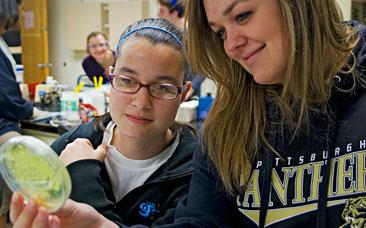 Many of our faculty are involved in science education research. Two major research interests are the efficacy of belonging and growth mindset interventions in large lecture classes for improving student performance, and the role of course-based authentic research experiences in increasing retention in STEM fields. Both of these projects address equity issues.
Many of our faculty are involved in science education research. Two major research interests are the efficacy of belonging and growth mindset interventions in large lecture classes for improving student performance, and the role of course-based authentic research experiences in increasing retention in STEM fields. Both of these projects address equity issues.
Beside science education research, many of our faculty also have grants for Pedagogical Innovations.
Psychosocial interventions to improve student performance
Dr. Erica McGreevy collaborates with Dr. Kevin Binning on research involving the use of psychosocial interventions to help students transition to college and create a sense of belonging. The intervention started in a single section of our large introductory biology lecture course and has now spread to all sections of Foundations of Biology 1 and courses in other departments. The ongoing work was recently recognized by the Provost’s Diversity in the Curriculum Award.
Provost's Diversity in the Curriculum Award
Erica McGreevy, Department of Biological Sciences with Kevin Binning, Department of Psychology and Chandralekha Singh, Department of Physics and Astronomy (2019)
Grant
Institute of Education Sciences Education Research Grant. Erica McGreevy (Department of Biological Sciences) (Co-I) with Kevin Binning (PI), Linda DeAngelo (Co-PI), R. Toutkoushian (Co-I), & Chris Schunn (Senior Personnel). Total award: $2M. (2021-2025)
Publications
Chen S, Binning KR, Manke KJ, Brady ST, McGreevy EM, Betancur L, Limeri LB, Kaufmann N. Pers Soc Psychol Bull 47(4):593 (2021).
Binning KR, Kaufmann N, McGreevy EM, Fotuhi O, Chen S, Marshman E, Kalender ZY, Limeri LB, Betancur L, and Singh C. Psychological Science 31(9):1059 (2020)
Course-based authentic research experiences to improve retention of students in STEM
The Department of Biological Sciences is a leader in the development of course-based undergraduate research experiences (CURES). The goal of these courses is to increase retention in STEM fields by providing project ownership and helping students identify as scientists. Starting with a phage-hunting program in Dr. Graham Hatfull’s lab, the Howard Hughes Medical Institute (HHMI) created the Science Education Alliance-Phage Hunters Advancing Genomics and Evolutionary Science (SEA-PHAGES) program. This is a two-semester discovery-based lab curriculum that is currently in use by over 200 institutions throughout the world. With support from HHMI and the Dean’s Office at the University of Pittsburgh, we have developed multiple introductory lab courses where students explore different research questions posed by our faculty with data pipelining back to the host lab. All our introductory biology labs have been converted to authentic research experiences, reaching ~2400 students yearly. A current list of our offerings is on our Introductory Research Lab page. Most of our upper division biology labs are also authentic research experiences based on faculty research projects.
Articles
Read "836 Pitt undergraduates contributed data for a new study on plants and pollution" in Pittwire 2024
Read “Undergraduate Lab Course Explores Genes Behind Neural Tube Anomalies” in Pittwire 2021
Read “Phage lab finds success with hybrid approach” in Pittwire 2020
Read “Lifesaving First in Medicine Boosted By Student Research in Hatfull Lab” in Pittwire 2019
Grants
HHMI Science Education Alliance Phage Hunters Advancing Genomics and Evolutionary Science (SEAPHAGES). Graham Hatfull, PI (2011-current).
HHMI Sustaining Excellence award for Course-based Research Experiences (CREs). Graham Hatfull (PI). Total award: $1.5M. (2014-2020).
SEA-PHAGES
Prize
2020 Peter Wildy Prize, Microbiology Society (UK) to Dr. Graham Hatfull for microbiology education and communication.
Wildy Prize Lecture, 2020-2021: Who wouldn't want to discover a new virus? Microbiology (Reading), 167 (2021). doi:10.1099/mic.0.001094
Publications
Turcotte, MM, Kaufmann, N, Wagner KL, Zallek, TA, Ashman, T-L. Evolution Letters, qrad072 (2024).
From Foundations of Biology Research Lab 1 on Duckweed Survivors.
Hildebrand JD, Leventry AD, Aideyman OP, Majewski JC, Haddad JA, Bisi DC, Kaufmann N. Biol Open 10(2):bio055640 (2021).
From Foundations of Biology Research Lab 2 on Neural Defects.
Hayes RA, Rebolleda-Gómez M, Butela K, Cabo LF, Cullen N, Kaufmann N, O'Neill S, Ashman TL. MicrobiologyOpen 10(1):e1158 (2021).
From Foundations of Biology Research Lab 1 on Flower Microbiome.
Hanauer, DI, Graham MJ, SEA-PHAGES, Betancur L, Bobrownicki A, Cresawn SG, Garlena RA, Jacobs-Sera D, Kaufman N, Pope WH, Russell DA, Jacobs Jr WR, Sivanathan V, Asai DJ, Hatfull GF. PNAS 114(510):13531 (2017).
A Measure of College Student Persistence in the Sciences (PITS Survey).
Hanauer DI, Graham MJ, and Hatfull GF. CBE Life Sci Educ. 15:ar54 (2016).
Measuring networking as an outcome variable in undergraduate research experiences.
Hanauer DI and Hatfull GF. CBE Life Sci Educ. 14:ar38 (2015).
A broadly implementable research course for first-year undergraduate students.
Jordan TC, Burnett SH, Carson S, Caruso SM, Clase K, DeJong RJ, Dennehy JJ, Denver DR, Dunbar D, Elgin SCR, Findley AM, Gissendanner CR, Golebiewska UP, Guild N, Hartzog GA, Grillo WH, Hollowell GP, Hughes LE, Johnson A, King RA, Lewis LO, Li W, Rosenzweig F, Rubin MR, Saha MS, Sandoz J, Shaffer CD, Taylor B, Temple L, Vazquez E, Ware VC, Barker LP, Bradley KW, Jacobs-Sera D, Pope WH, Russell DA, Cresawn SG, Lopatto D, Bailey CP, and Hatfull GF. mBio 5:e01051 (2014).
Active Assessment: Assessing Scientific Inquiry
Hanauer DI, Hatfull GF, and Jacobs-Sera D. Springer Press (2009).
Hanauer DI, Jacobs-Sera D, Pedulla ML, Cresawn SG, Hendrix RW, and Hatfull GH. Science 314:1880 (2006).
Full listing of SEA-PHAGES publications
